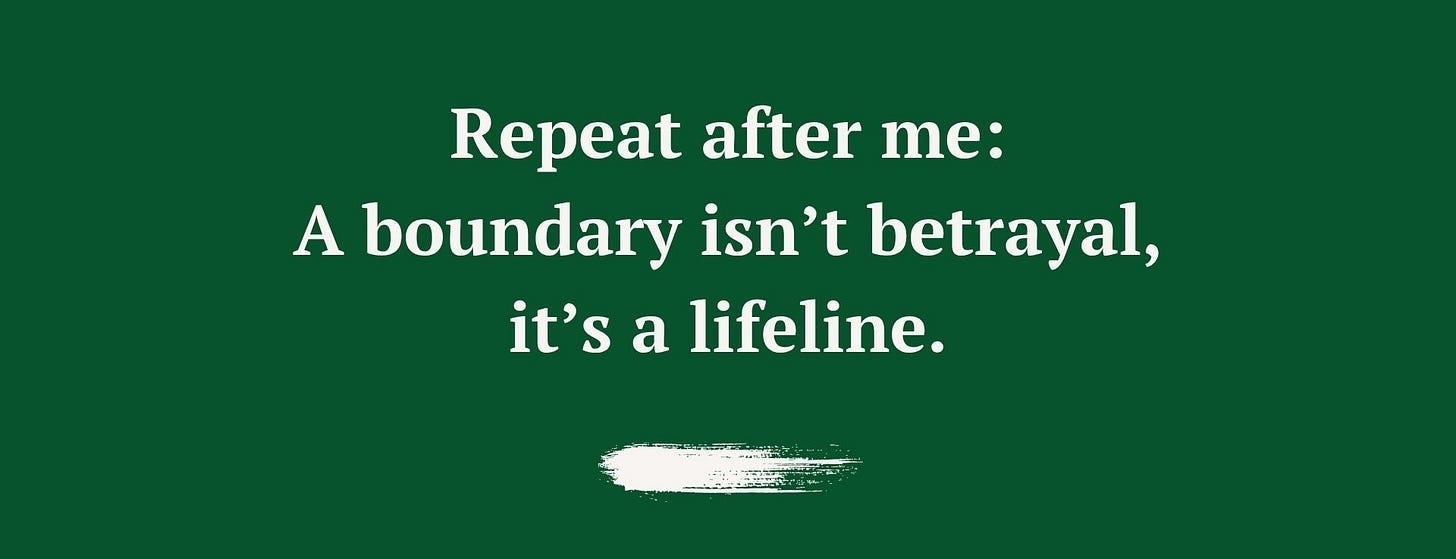How the heck do you say NO when you’re grieving?
It’s hard because your mind is scattered from your loss and now people are placing demands on you. It can feel overwhelming, unfair and like you’re suffocating under the weight of their expectations, and maybe even your own because you want to step up and face the world… to do the “right” thing.
It’s what you’re supposed to do, right?
But I’ll tell you something I wish someone had told me when I lost my dad.
You will get pulled in a multitude of directions, and if you don’t set boundaries with family, friends and others, your health will suffer. You’ll feel like shit. And it will make your grief much worse.
I know boundaries can feel especially harder in mid‑life grief because:
You’re the executor and the emotional sponge.
Adult kids still need you. Younger kids definitely need you.
Work deadlines don’t pause for heartbreak. 3 days of bereavement leave do diddly squat to help you.
Well‑meaning relatives and neighbors drop opinions like confetti (like, shut up).
The result? Over‑extension that morphs grief into burnout.
Now, here’s how to recognize the boundary red flags:
Body Clue: Tight jaw during texts
Translation: I’m bracing for “more”
Body Clue: Instant fatigue at invites:
Translation: My capacity is maxed.
Body Clue: Resentment after saying “Yes…”
Translation: A boundary was crossed.
Notice which one shows up first— because your body whispers before your mind shouts.
Now, I’m going to give you something I wish I had when my dad died:
My “3‑Line Boundary Script”
Use this when you’re dealing with anyone who is pushing your limits so you get some breathing room.
Here’s how it goes:
Acknowledge: “I understand this is important.”
State capacity: “Right now, my energy is focused on healing and my immediate needs.”
Offer an alternative or a firm close:
Alternative: “Let’s revisit this in two weeks.”
Firm close: “I’m not able to take that on.”
Practice it in the mirror until your voice stops shaking.
Or if you simply can’t muster up the words, text or email them. Don’t go back and forth.
Give them a try. You might surprise yourself at how well this works.
Try this mini somatic reset for boundary guilt (90 seconds)
Sit, feet flat.
Inhale 4 counts → feel your ribs expand.
Exhale 6 counts while pressing both heels into the floor.
Whisper: “It’s safe to protect my space.”
This tells your nervous system you chose your safety over others, and you’re not being selfish.
Here are some quick boundaries you can use, starting today:
Phone curfew: No family calls or texts after 8 p.m.
Grief‑day auto‑reply: “I’m offline today for personal reasons—back tomorrow.”
Support swap: Instead of you cooking, ask a friend to drop off a meal or grab take-out.
Estate buffer: Hire a mediator or delegate paperwork to a trusted advisor or friend for a week.
I want you to remember this:
Every “no” preserves energy for what truly matters:
Healing, resting, remembering, living.
A boundary isn’t a wall around your heart.
It’s a door you decide when to open.
Take one more 4‑6 breath, feel your feet—then write the boundary you’ll set this week. Use one I’ve suggested or create one that you need – and you don’t need anyone’s permission to take care of yourself.
Sending strength and love,
Karen 💜





